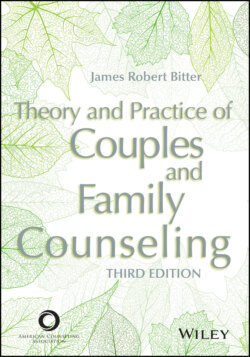Читать книгу Theory and Practice of Couples and Family Counseling - James Robert Bitter - Страница 95
Participatory Ethics
ОглавлениеAnother perspective on ethics is grounded in postmodern philosophy, thought, and sensibilities: It is called participatory ethics. Postmodernism is based on a multiplicity of realities and truths; it values people’s meaning-making processes as they create narratives of experience, and it examines dominant cultures that impede the self-agency of people who have only marginal participation in society. Feminism, social constructionism, and multiculturalism have all embraced this shift away from the modern to the postmodern. Participatory ethics invites families to be cocontributors to the ethical decision-making processes in family practice (Rave & Larsen, 1995). Postmodernists have critiqued family counseling and therapies based in modernist philosophy as attempts to colonize clients by viewing family practitioners as the keepers of knowledge and the people responsible for any decision related to counseling or therapy (see Hoffman, 1985). Participatory ethics seeks to include and value the knowledge brought to counseling or therapy by families. Client feedback on the processes of family practice is encouraged. That is, client input is valued as expert in relation to how individuals, couples, and families experience their own lives, and practitioner expertness is related to leadership of the therapeutic process.
For our family with the 14-year-old child, how might their stories of lived experience be prized? How, if at all, has the dominant discourse in which this family is situated oppressed their self-agency? Their self-determination? A family practitioner adopting participatory ethics might invite and emphasize the family’s experience and meaning-making processes in interactions with the dominant culture or the stories told by the court system about child neglect and how such stories influence the preferred view of the family. As participatory ethics attends to the marginalized, the voice of the 14-year-old child might be encouraged and amplified. The family counselor could work with the parents to help them imagine themselves through the eyes of their child, to imagine what the experience of the situation might be like and what the child’s preferred choices might be. The postmodern shift to participatory ethics can be quite powerful: In this model, the family practitioner’s position of power is counterbalanced by honoring the family’s own power in their process of living.
We have introduced three perspectives on ethics: principle, virtue, and participatory ethics. Take a moment to reflect on the essence of each of these perspectives and your emotional reaction to them. With principle ethics, you have externally derived guidelines based on at least six principles to guide your professional actions. Virtue ethics calls on you and the helping professions to examine the character traits essential to family practice and how these characteristics may impact ethical processes. Last, participatory ethics takes you to the space between you and your clients, to the relationship in which clinical decisions are coconstructed and negotiated with families. What are the potential positives in each that you see? What are the problems? What does your gut tell you about your thoughts and feelings about each? Now look at your answers to these questions. What do they say about you and your work with families? If you are not satisfied by one and only one perspective on ethics, then which blend fits for you? How would you integrate that blend into a functional model? Continue to ponder such questions as we now move through various models of decision-making.
